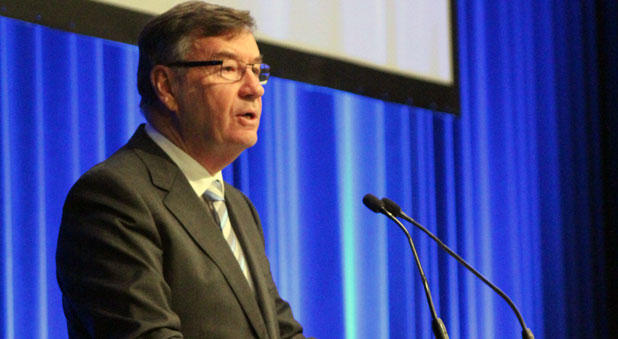Archbishop Glenn Davies, in his Presidential address opening the 2016 Synod, or Parliament, of the Anglican Church, has spoken of Sydney's urban sprawl and efforts to establish new churches on the fringe of the city.
"We have a strategy for the ongoing purchase of land, a strategy for the establishment of a building for a church community. We have a strategy for raising up able church planters for these new congregations. The only gaps in funding our growth strategies is in church planting in urban areas and in the redevelopment of existing urban church buildings to accommodate the growing urban population in our Diocese." Dr Davies said.
The Archbishop spoke of the 5 year mission of the Diocese, Mission 2020, and commended rank and file Anglicans for their work in churches.
"...the contribution of both laity and clergy enables our churches to flourish and our organisations to prosper. I am constantly amazed and regularly impressed by the commitment of time, energy and expertise that lay people give to the work of our Diocese. Most often through boards of governance or school councils, but also as employees within our many organisations, let alone serving as wardens, parish councillors, nominators or Synod representatives. These labours are not in vain, and I thank God for the gifts he has given to his people in our Diocese so that the body of Christ might be strengthened and opportunities for the love of Christ to be displayed throughout our cities and suburbs, so that Christ might be honoured as Lord and Saviour in every community."
"Our greatest resources are our people—men and women, who have been captivated by the love of God and have brought their lives into conformity with his word and seek opportunities to see Christ honoured as Lord and Saviour in every community. " Dr Davies said.
Dr Davies touched on the yet-to-be-released results of the 2016 census, during which there was a major campaign for people to identify with 'no religion'.
"Of particular interest to us will be the percentage of those who identify as Christians, which in 2011 was 61%. The push for Australians to mark ‘No religion’ may have its effect on this statistic for 2016, especially as the ‘No religion’ option was placed first in answer to ‘What is the person’s religion?’ While it is true that 61% does not translate into that percentage of Australians who attend a Christian church, the statistic is still a significant pointer as to where people see themselves, and how well we are penetrating the atheism, agnosticism and non-Christian religions of Australian culture."
The Archbishop spoke of what he called the 'salutary' warnings, contained in testimony before the Royal Commission into Institutional Responses to child abuse.
"Regrettably poor procedures, defective advice, inadequate record-keeping and flawed leadership have contributed to the impression that Anglican churches are not safe places for children and young people." referring to recent hearings on abuse in the Anglican dioceses of Hobart and Newcastle.
"While we may respond that Anglican cases of child sexual abuse are a small proportion of other cases of institutional abuse, and far fewer than those in the Roman Catholic Church, the reality remains that we have failed in this area. One case of sexual abuse against a child is one too many. While we have improved our procedures, increased awareness and training for all church workers, we have lost ground in the collective consciousness of the Australian society." Dr Davies said.
The Archbishop also spoke of the same-sex marriage debate, which will be the subject of discussions later in the Synod.
"I believe a plebiscite is justified as a legitimate process for determining such a fundamental change to the definition of marriage that has well served humanity since the dawn of civilisation, that is, when God first designed marriage for the benefit of human society. " he said. "If people are to vote intelligently they need to understand the consequences. My request for equal funding of both sides of the question, which I put to the Prime Minister in our meeting with Heads of Churches in February this year, was premised upon the ever present bias towards the ‘Yes’ case in our media and the reprehensible censure of views which simply uphold the current law."
Dr Davies spoke of the church's engagement in many significant social areas.
"The society in which we live presents challenges of unbelief and outright hostility to the Word of God, of which our commission from the risen Jesus is still as pressing as it was when first delivered—to make disciples of all nations. The fourth priority of Mission 2020 is to ‘Respond to the Changing Face of our Society’. Our engagement in the public debate on same-sex unions is one such response. However, other questions such as gambling, domestic violence, asylum seekers and refugees are all issues in which we can bring the grace of God and the love of God into the market-place of ideas."


























